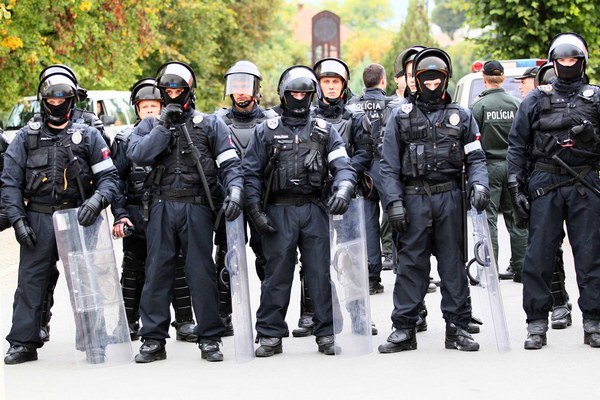Justice denied: victimising the victims of police violence in Slovakia
18 November 2014
In an earlier ERRC blog (co-written with Adam Weiss) I described the story of E. - a young man of Romani origin who had been kept in detention for several weeks despite being diagnosed with an intellectual disability. E. is one of the inhabitants of the Roma settlement located in Moldava nad Bodvou (eastern Slovakia) which was raided by police in June 2013, resulting in injuries to more than 30 individuals including children. Almost a year and half has passed since that violent raid, and no real progress in the investigation is visible.

© SME newspaper – Tibor Somogyi
The police’s actions were first examined by the Department of Control and Inspection Service (DCIS) of the Ministry of Interior of the Slovak Republic. As the body responsible for investigating misconduct of police officers, it has been widely criticised both domestically and internationally for not fulfilling the essential requirements of independence and impartiality. The DCIS did not find any police misconduct in this case and did not refer the case for criminal proceedings. This is hardly a surprising outcome as none of the DCIS’s employees made any effort to visit the victims of the violence.
Another body which dealt with the case was the Slovak Ombudsperson. When trying to get access to official police reports from the raid, her employees faced unexpected obstructions. Eventually, the Ombudsperson found violations of rights of those living in the settlement and produced a thorough report. She intended to present it in the Parliament but was thwarted by the MPs of the governing party who were not interested in hearing her.
Hope reemerged when the Prosecutor General ordered the reopening of the case and referred it to a different inspection department for criminal investigation. Still, neither any accusation nor any charges have yet been brought against the police officers who took part in the raid in Moldava nad Bodvou. Taking into account that the investigating police officer heard the testimonies of more than 50 victims and witnesses, ordered actions such as medical expert examinations, confrontations between victims and those suspected from misconduct, and identification parades, and the fact that at the pre-trial stage of criminal proceedings the burden of proof does not require “proof beyond reasonable doubt”, the ongoing investigation is beginning to look ineffective.
Recently, the investigating police officer ordered psychological examinations of many of the victims and witnesses. This unusual step gives the impression that instead of concentrating on finding the perpetrators, the investigation is now focused on undermining the credibility of those giving evidence against the police officers. It also raises the question whether psychological state of each witness in each criminal proceedings is examined – whether a Roma or not. This looks less like good policing and more like harassment and re-victimisation of the victims …




